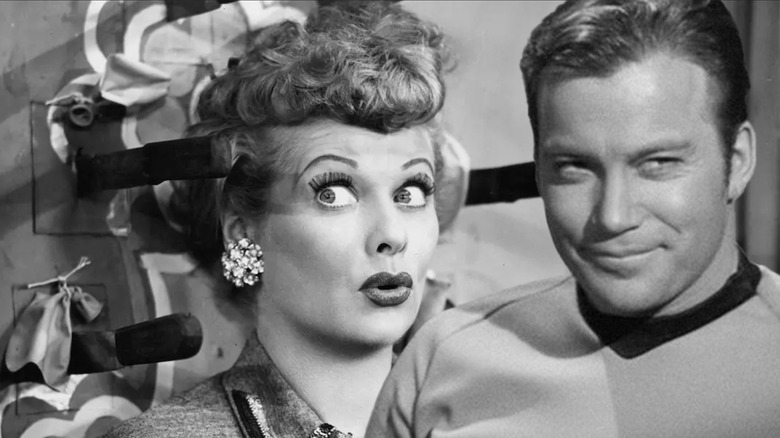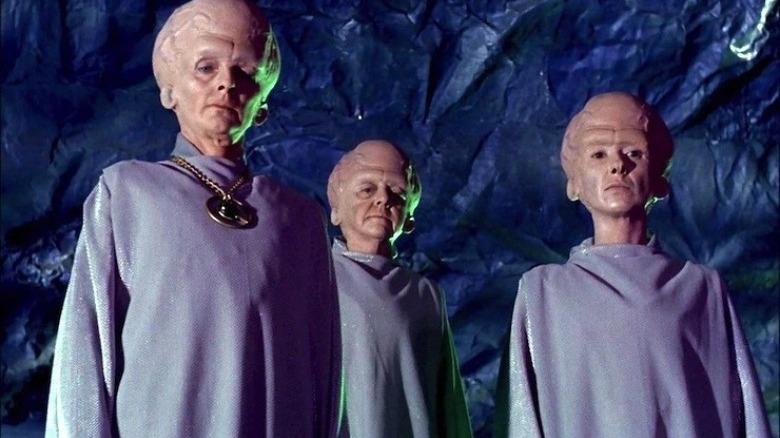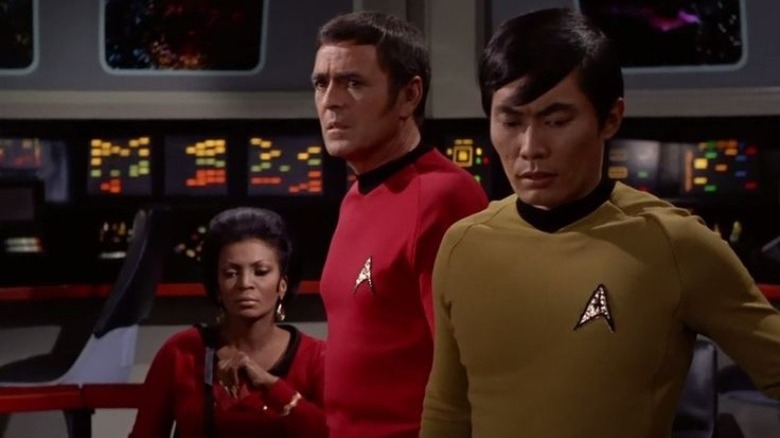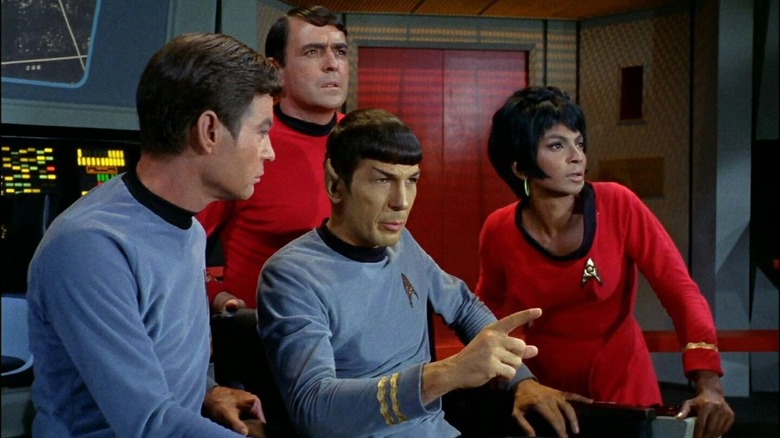Lucille Ball Suffered Life-Changing Sacrifices For Star Trek
The TV studio Desilu was founded in 1950 by Lucille Ball and Desi Arnaz, which you can probably tell by the name. The famous performing couple initially pitched a TV adaptation of the marriage-based radio sitcom "My Favorite Husband" to the execs at CBS, but that show eventually mutated into "I Love Lucy," more explicitly sold as a vehicle for Ball. To this day, "I Love Lucy" remains one of the most popular sitcoms of all time, and every modern comedy show contains traces of its DNA. The series ran for 180 episodes over six seasons, ending its run in 1957. Lucy and Desi divorced a few years later, and Ball became the sole owner of Desilu.
Desilu oversaw a wide spectrum of shows, from sitcoms like "Our Miss Brooks" and variety shows like "Shower of Stars," but also Westerns like "The Life and Legend of Wyatt Earp" and adventure programs like "Whirlybirds." When Ball took over sole ownership in the 1960s, her plans became far more ambitious. Ball oversaw the later seasons of notable shows like "The Untouchables," as well as "Mannix," "Mission: Impossible," and, most importantly to this article, "Star Trek."
According to stories told in the 2016 book "The Fifty-Year Mission: The Complete, Uncensored, Unauthorized Oral History of Star Trek: The First 25 Years," edited by Mark A. Altman and Edward Gross, Ball was incredibly keen to promote "Star Trek." Despite being a relatively expensive show, and one that wasn't earning boffo ratings, Ball continued to push and push for the series. Sadly, her insistence on producing Gene Roddenberry's sci-fi program contributed to Ball selling off Desilu entirely. It seemed that her business legacy would have to end to launch a new one.
I Love Lursa
Marc Cushman has orbited "Star Trek" for many years, but his most famous contribution involved pitching the story that would eventually become the "Star Trek: The Next Generation" episode "Sarek." Cushman also authored or co-authored several notable sourcebooks related to Trek, including 2013's "These Are the Voyages: TOS Season One," and "These Are the Voyages: Gene Roddenberry and Star Trek in the 1970s, Volume 1 (1970-75)." In addition to "Star Trek," Cushman also wrote for other high-profile shows like "Beyond Belief: Fact or Fiction" and "Diagnosis Murder." Perhaps most impressive was Cushman's main career — under the nom de plume Cash Markman — as a writer of erotic films. As Markman, he wrote multiple "Sex Trek" movies, including "Charly XXX," "Sex Trek: The Man Eater," "XXX Trek: The Final Orgasm," and "Sex Trek V: Deep Space Sex."
Cushman, being learned in the world of "Star Trek" knew all about Lucille Ball's struggles with Desilu in the mid-1960s. It seems that people around Ball advised her not to invest in "Star Trek," but she defied them and did it anyway. Cushman told the following story:
"Lucille Ball lost her studio because of 'Star Trek.' She had gambled on the show, and you can read the memos where her board of directors is saying, 'Don't do this show, it's going to kill us.' But she believed in it. She moved forward with it, and during the second season, she had to sell Desilu to Paramount Pictures. Lucille Ball gave up the studio that she and her husband built, it's all she had left of her marriage, and she sacrificed that for 'Star Trek.'
It's worth noting that Paramount has owned "Star Trek" ever since.
'What would Desi do?'
Although Ball and Arnaz have separated, it seems that Lucy still respected her ex-husband's keen business acumen, preferring to take business cues from his old habits. Cushman stated it thus:
"Desi wasn't there anymore. So Lucy is asking herself, 'What would Desi do?' because she really loved and respected him. 'Desi would get more shows on the air that we own, not just that we're producing for other companies.' That was her reasoning to do 'Star Trek' — and she felt that this show could, if it caught on, rerun for years like 'I Love Lucy.' And guess what? Those two shows — 'I Love Lucy' and 'Star Trek' — are two shows that have been rerunning ever since they originally aired."
So Ball perhaps knew what she was doing. She believed in "Star Trek," and felt that it was to be an important part of the Desilu identity. That it was put in eternal syndication was perhaps the largest contributing factor to the franchise's longevity. Sadly, Ball herself didn't get to ride that train very long. Cushman recalls that Trek was just too expensive to maintain. He said:
"Lucy's instincts were right about 'Star Trek,' that it would become one of the biggest shows in syndication ever. The problem was that her pockets weren't deep enough. They were losing $15,000 an episode, which would be like $500,000 per episode today. You know, if she could have hung on just six months longer, it would have worked out, because by the end of the second season, once they had enough episodes. 'Star Trek' was playing in, I believe, 60 different countries around the world. And all of that money is flowing in."
Before those six months were up, Desilu was already sold.
The fake smile
Cushman even knew about Ball's attempts to flee the sale. Evidently, she delayed signing the contract with Paramount by leaving town for a few days. Cushman seems to feel that Ball was heartbroken over everything. He said:
"She had no choice but to sell. She actually took off and went to Miami. She ran away because it was so heartbreaking to sign the contract. They had to track her down to get her to do it. There's a picture of her cutting the ribbon after they've torn down the wall between Paramount and Desilu, and she's standing next to the CEO of Gulf and Western, which owns both studios now, and she's trying to fake this smile for the camera, and you know it's just killing her."
The New York Times reported at the time that Ball was to remain president of Desilu after the sale. One can see the photo Cushman is referring to online. Ball seems to be smiling in the picture as Charles Bluhdorn, wearing shades, looks at her cutting the ribbon. the ribbon was made of 70mm film strips. Immediately after the 1967 sale, Desilu was effectively defunct, and Paramount Television was born. "Star Trek" was permitted to survive and survives to this day. Even through various studio schisms and re-mergers, "Star Trek" has persisted. It seems that Lucy gave the show its one final push into immortality before backing off and letting others take the reins.
Ball, meanwhile, lost the studio with her name on it. One might say it was a heartbreaking sacrifice.



